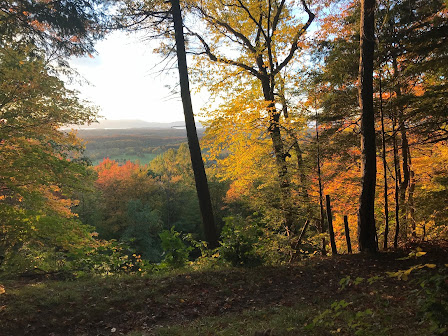P.M. — To Cliffs.
 |
| October 11, 2019 |
Looking under large oaks, black and white, the acorns appear to have fallen or been gathered by squirrels, etc. I see in many distant places stout twigs (black or scarlet oak) three or four inches long which have been gnawed off by the squirrels, with four to seven acorns on each, and left on the ground. These twigs have been gnawed off on each side of the nuts in order to make them more portable, I suppose. The nuts all abstracted and sides of the cups broken to get them out.
The note of the chickadee, heard now in cooler weather and above many fallen leaves, has a new significance.
There was a very severe frost this morning (ground stiffened), probably a chestnut-opening frost, a season ripener, opener of the burs that inclose the Indian summer. Such is the cold of early or middle October. The leaves and weeds had that stiff, hoary appearance.
H. D. Thoreau, Journal, October 11, 1859
Looking under large oaks, black and white, the acorns appear to have fallen or been gathered by squirrels. See October 11, 1860 ("The best time to gather these nuts is now -, when a strong wind has arisen suddenly in the day, before the squirrels precede you.")
The note of the chickadee, heard now in cooler weather and above many fallen leaves, has a new significance. See October 4, 1859 ('I hear . . . the sweet phe-be of the chickadee.”); October 5, 1858 ("Phebe note of Chickadee often these days"); October 6, 1856 ("The common notes of the chickadee, so rarely heard for a long time, and also one phebe strain from it, amid the Leaning Hemlocks, remind me of pleasant winter days, when they are more commonly seen. “); October 10, 1851 ("The chickadee, sounding all alone, now that birds are getting scarce, reminds me of the winter, in which it almost alone is heard."); October 10, 1856 ("The phebe note of the chickadee is now often heard in the yards"); October 13, 1852 ("It is a clear, warm, rather Indian-summer day . . . The chickadees take heart, too, and sing above these warm rocks."); October 13, 1859 (“The chickadee seems to lisp a sweeter note”); October 13, 1860 ("Now, as soon as the frost strips the maples, and their leaves strew the swamp floor and conceal the pools, the note of the chickadee sounds cheerfully winteryish."); October 15, 1856 ("The chickadees . . . resume their winter ways before the winter comes.") See also A Book of the Seasons, by Henry Thoreau, the Chickadee in Winter
October 11. See A Book of the Seasons, by Henry Thoreau, October 11
The chickadee's note
has a new significance
in cooler weather.
A Book of the Seasons, by Henry Thoreau,
A Book of the Seasons, by Henry Thoreau
"A book, each page written in its own season,
out-of-doors, in its own locality.”
~edited, assembled and rewritten by zphx © 2009-2024
https://tinyurl.com/HDT591011





No comments:
Post a Comment